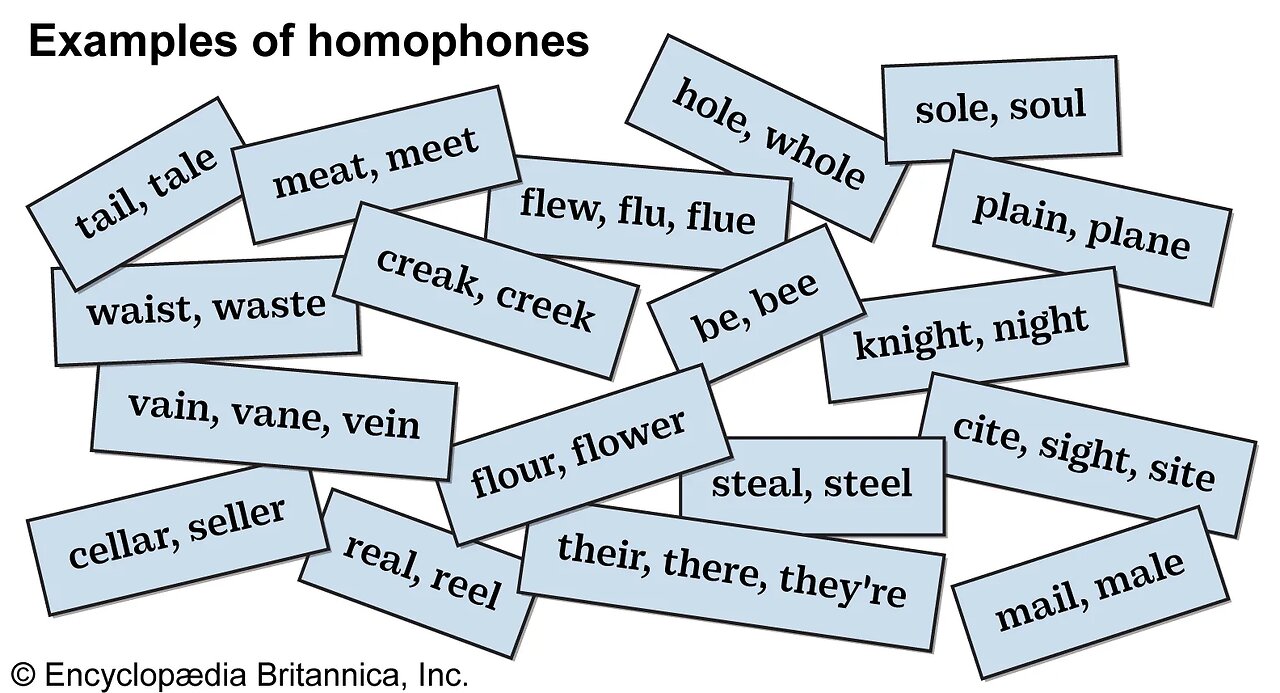Premium Only Content

TO vs. TOO vs. TWO: How-to Use : Homophones Made Easy: TO vs. TOO vs. TWO
TO vs. TOO vs. TWO: How-to Use : Homophones Made Easy: TO vs. TOO vs. TWO
Homophones are words in the English language that sound the same when spoken but have different meanings and often different spellings. They can be a bit tricky, especially for students learning English as a second language, but understanding them is important for clear communication. Here's a more detailed explanation:
1. Sound the Same: Homophones are words that are pronounced in the same way, or they have very similar pronunciations. This means that when you say them out loud, they sound identical, even though they may be spelled differently.
2. Different Meanings: Despite sounding the same, homophones have different meanings. Each word has its own unique definition and usage in sentences. This is why it's crucial to understand which homophone to use in a particular context to convey the intended meaning.
3. Different Spellings: Homophones are often spelled differently from each other. In some cases, the spelling may be quite similar, but there are usually subtle differences. These differences in spelling are what distinguish one homophone from another.
4. Common Examples: Homophones are common in the English language. Some well-known examples include "there," "their," and "they're," which all sound the same but have different meanings and spellings.
5. Context Matters: To choose the correct homophone in a sentence, you need to consider the context or the words around it. Understanding the context helps you determine which homophone is appropriate to convey the intended message.
6. Practice is Key: Learning homophones can be challenging, but with practice and exposure to the language, you can become proficient at using them correctly. Reading, listening, and speaking in English are all helpful ways to improve your understanding of homophones.
7. Common Homophones: There are many sets of homophones in English, such as "to," "too," and "two," "its" and "it's," "your" and "you're," "where" and "wear," and many more. Each set has distinct meanings and uses.
8. Clear Communication: Understanding and using homophones correctly is essential for clear and effective communication in English. Using the wrong homophone in a sentence can lead to misunderstandings, so it's important to pay attention to these words.
In summary, homophones are words in English that sound the same but have different meanings and spellings. Learning to distinguish and use them correctly is an important aspect of improving your English language skills, especially for those studying English as a second language. Practice and exposure to the language will help you become more confident in using homophones in your writing and speaking.
-
 3:07:17
3:07:17
Alex Zedra
9 hours agoLIVE! New Game | Exorcism!??
31K4 -
 6:00:06
6:00:06
SpartakusLIVE
12 hours agoThe Conqueror of Corona || Delta Force LATER
81.8K3 -
 2:17:30
2:17:30
barstoolsports
15 hours ago$250k Winner Revealed With Final Votes And Reunion | Surviving Barstool S4 Finale
131K9 -
 2:05:49
2:05:49
Kim Iversen
13 hours agoTikTok Ban BACKFIRES: Millions Flee To New App Showing The REAL China
119K170 -
 1:35:12
1:35:12
Glenn Greenwald
15 hours agoCNN And Jake Tapper In Deep Trouble In Defamation Lawsuit: With Jonathan Turley; TikTok Ban, Trump's China Policy, And More With Arnaud Bertrand | SYSTEM UPDATE SHOW #390
112K85 -
 12:24
12:24
Dan Bongino Show Clips
16 hours agoPresident Trump Full Interview - 01/16/25
137K300 -
 1:27:39
1:27:39
Man in America
15 hours agoBig Pharma's Deadliest Lie is Being EXPOSED to the Masses w/ Jonathan Otto
103K40 -
 1:40:08
1:40:08
Precision Rifle Network
1 day agoS4E2 Guns & Grub - Training Vs. Competition
51.8K2 -
 58:27
58:27
Flyover Conservatives
1 day agoGarrett Ziegler Breaks Down Special Councilor’s Report on Hunter Biden. Insights for Trump’s Top Picks. | FOC Show
75.7K6 -
 44:54
44:54
Steve-O's Wild Ride! Podcast
18 hours ago $11.47 earnedMark Wahlberg Threatened To Beat Up Jackass Cast Member - Wild Ride #251
122K15